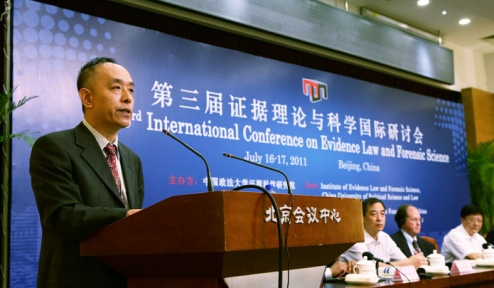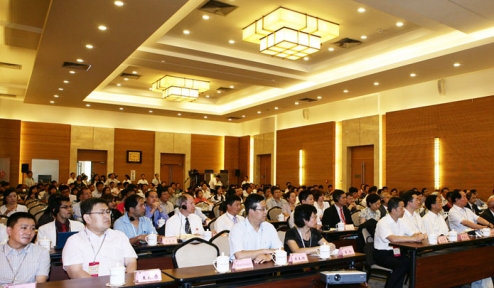On July 16 to 17, 2011, the third International Conference on Evidence Law and Forensic science which hosted by Institute of Evidence Law and Forensic Science of China University of Political Science and Law convened ceremoniously in Beijing. 141 evidence law scholars and forensic scientists, who come from 12 countries across five continents, China and Taiwan district, spread out thorough deliberate around the theme of the conference ”Evidence science and Justice Judicial- Present and Future”.

In the Opening Ceremony, Professor Huang Jin, the president of China University of Political Science and Law, gave warm welcome speech first, and expressed enthusiastic congratulations on the successful holding of the third International Conference on Evidence Law and Forensic Science. He pointed out that, since the first conference in 2007 and the second one in 2009, the third international conference has grown up to a comparatively mature international forum of evidence law and evidence science, it has become an important platform to evidence law scholars and forensic scientists all over the world to carry out interdisciplinary exchanges. The crossover study of evidence law and forensic science let the evidence collection, identification and fact-finding process not only can be obtained the strong support of means of science and technology, but also the guarantee of the evidence law, thereby maximizing the possibility to discover the truth of the cases. On this background, the Ministry of Education granted an official approval to CUPL's application for establishing Key Laboratory for Evidence Science, CUPL, in December 2005, which has far-reaching significance on promoting the comprehensive research on natural science and social science. The convening of the international conference will cause much promotion to the development of Evidence Science and the improving of the system of evidence.
Hu Yunteng, the director of the Supreme People’s Court Laboratory, pointed out in his speech that, this is a grand academic meeting in evidence science. China is revising the Criminal Procedural Law, so this meeting is very opportune; people pay more attention to the role of evidence, because engaging in a lawsuit means engaging in evidence; the design of evidence rules should consider the current situation and the demand of people of China. Evidence System with Chinese Characteristics should focus on grassroots level, consider the need of grassroots level, ensure judicial justice and reflect our mature experience in the practice. Zhang Donggang, Vice Director of Department of Social Science of the Ministry of Education, pointed out in his speech that, comparing to the previous two sessions, this conference on evidence science has a more improved level and specification. He also point out that, expansion of open education is the important measure to accelerate the building of the world top university and high level university. In the next five to ten years, the Ministry of Education will set up special international academic conference program, to support colleges and universities to host the high level international academic conferences. The International Conference on Evidence Law and Forensic Science started by Institute of Evidence Law and Forensic Science of CUPL is the landmark. The establishment of the International Association of Evidence Science promoted by Institute of Evidence Law and Forensic Science of CUPL is an exploratory, prospective, and seminal work, and will produce very important effect on the internationalization of the China law.

Huo Xiandan, the director of Forensic Administration Bureau of Ministry of Justice, pointed out that evidence and proof is cross-specialty, interdisciplinary and cross-field; evidence science technology is the comprehensive application of natural science, human science and engineering technology; judicial activities involve two areas of activities of litigation and activities of science and technology; adjusting the judicial activities involves norms of conduct, such as the legal norms, administrative norms and technical specifications and so on. In the amending of procedural law, require further unified understanding, through innovative legal talent training model, using "produce, learn, research" integrated mechanism to foster interdisciplinary, compound type and high level professional talents in evidence.
Heesun Chung , Director General of National Forensic Service in Korea, Edward Hoseah Ph.D, Director General of the Prevention and Combating of Corruption Bureau in Tanzania, David Fowler, Chief Medical Examiner of Office of the Chief Medical Examiner, State of Maryland, U.S., expressed enthusiastic congratulations on the convening of the third International Conference on Evidence Law and Forensic Science.
After the opening ceremony, professor Allen, John Henry Wigmore Law professor of Northwestern University, U.S., Yangtze River scholar lecture professor of CUPL, gave the keynote speech of “The Future of Evidence Law” ; Chen Guangzhong, the life-long professor of CUPL, gave the keynote speech of “On The Principle of Evidentiary Adjudication in Criminal Litigation” ; Michele TARUFFO, University of Pavia, Italy, gave the keynote speech of “Applying Scientific Standards to Social and Forensic Evidence” ; Imwinkelried, professor of University of California, Davis, U.S., gave the speech of “ The End of Representation era”. From the afternoon of July 16, 2011, the conference was divided into evidence law and forensic science two sub-venues to discuss related topics.
In the afternoon, July 17, 2011, the 1st Plenary Session of the 1st Council of the International Association of Evidence Science was held. BY-LAWS OF THE INTERNATIONAL ASSOCIATION OF EVIDENCE SCIENCE was adopted unanimously by conference representative, and the first board chairman, vice chairman, director and executive committee was determined by conference representative. According to the BY-LAWS, the head office of International Association of Evidence Science is located in Chicago, United States, and its Executive Committee and the Secretariat are located in Institute of Evidence Law and Forensic Science (IELFS) of China University of Political Science and Law (CUPL).
According to the introduction of Professor Zhang Baosheng, the vice president of CUPL and the director of Institute of Evidence Law and Forensic Science (IELFS) of China University of Political Science and Law (CUPL), evidence science is a new cross discipline appeared at the beginning of this century. It is a comprehensive application subject combing the method of natural science and social science to study the technology of evidence collection, identification and the general laws of science theory and method system of case fact-finding and application of law. Foreign evidence science research mainly focuses on the pure theory, Chinese evidence of scientific research is focus on integration of theory and practice, known as “practice school” in evidence science , develop a school of its own in the world. Since 2005 December the Ministry of Education (MOE) granted an official approval to CUPL's application for establishing Key Laboratory for Evidence Science, In 2006, Institute of Evidence Law and Forensic Science of CUPL was officially founded, the institute has forensic science and evidence law two major fields of research; evidence law, forensic medicine and material evidence technical three main research directions; realize the “Three in One” development pattern of the teaching, research and forensic service. The institute began to hosting Biennial International Conference on Evidence Law and Forensic Science in 2007. “Evidence Science Application and Research Innovative Team” was approved and chosen as one of “Program for Changjiang Scholars and Innovative Research Team in University” of Ministry of Education in 2009. “Fada Institute of Forensic Medicine & Science” was approved and chosen as one of Top Ten National Forensic Institutes by the Commission of Politics and Law of the CPC Central Committee in 2010. The world’s first International Association of Evidence Science which was born in this international conference will make the international academic exchanges of evidence science enter into a new stage of development.

